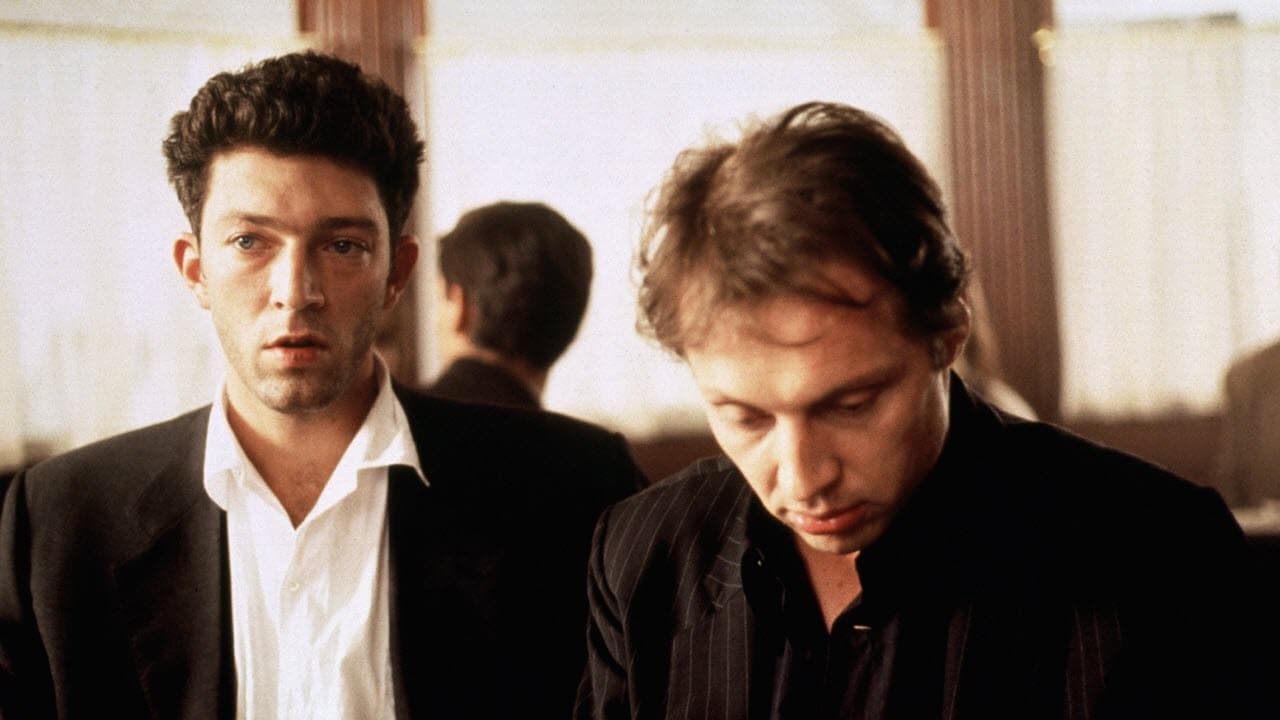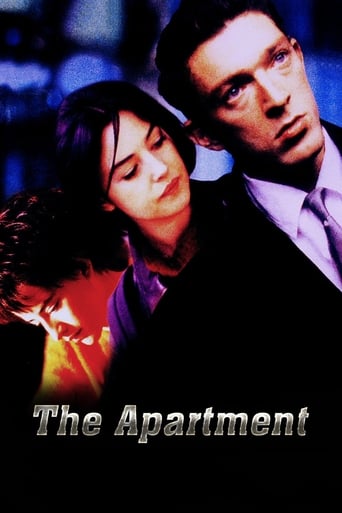

L'Appartement is a French film that stars Vincent Cassel, Monica Bellucci and Romane Bohringer.It was directed by Gilles Mimouni.The movie follows the romantic obsession of Max (Cassel), a young corporate hotshot who leaves his successful new world behind to search for his elusive lost love Lisa (Bellucci). His mad quest begins after he accidentally overhears Lisa's melodic voice speaking in the phone booth next door. But before he knows it she is gone. Still, he is so elated that he abandons his plans, lies to his fiancée, and after leaving his luggage with his pal Lucien, sets off to find her. The hunt leads to a fabulous apartment, where he saves a girl from a suicide thinking that she is Lisa. But this girl, Alice is as drab and mousy as Max's Lisa is beautifully feline. Max becomes involved with Alice, unaware that she also dates Lucien. Meanwhile the real Lisa attempts to break free from her obsessive rich lover who may have murdered his wife. For this reason, she continues to avoid her apartment, which she has generously loaned to Alice. When these characters collide, the stage is set for a tragic denouement.The Apartment is more intriguing in terms of its technical attributes than anything else. The convoluted plot ensures that the viewer is kept at arm's length throughout the film and although everything comes together fairly well in the third act, the overly deliberate pace and seemingly aimless vibe make it difficult to actually care once that happens. That being said, there's no denying the effectiveness of the performances and the film does seem as though it'd improve on repeat viewings - yet in terms of its ability to make any kind of emotional impact on the viewer.
... View MoreAfter two years working in New York in the 90's, the successful executive Max Mayer (Vincent Cassel) returns to Paris and will sooner get married to his fiancée Muriel (Sandrine Kiberlain). He has a meeting in a restaurant with Japanese executives and then he will travel to Tokyo. However, he glances at a woman leaving a telephone booth and he believes she is Lisa (Monica Bellucci), the greatest love of his life who had disappeared years ago. He finds the key of a Parisian hotel room in the booth and he calls off his trip to Tokyo trying to meet Lisa in the hotel. He sneaks into the empty room; finds an obituary and goes to the cemetery expecting to find Lisa. Then he follows the stranger Daniel (Olivier Granier), whose name he had overheard in the booth cabin, and finds an apartment that he supposes is Lisa address. Meanwhile Max recalls his romance with Lisa in flashbacks. Max borrows the car of his best friend Lucien (Jean-Philippe Écoffey), who is in love with his girlfriend Alice, to go to the apartment wait for Lisa. However, he finds another woman also called Lisa (Romane Bohringer). The mystery is clarified through the flashbacks."L'Appartement" is an intriguing thriller about missing encounters, obsession and serendipities with a disappointing and incoherent conclusion. The non-linear screenplay keeps the mystery until the very end. The performances of Vincent Cassel, Monica Bellucci and Jean- Philippe Écoffey are excellent, but the sexy Romane Bohringer steals the movie in the role of an outcast woman obsessed by her only girlfriend. Unfortunately there are many flaws and holes in the story. The first one is indeed a continuity mistake, with Max's scarf vanishing when meets Lucien in the stairway and in the restaurant, but back around his neck when he goes to the airport. There are questions not answered: Why Lisa had lodged in a hotel in Paris if she has her own apartment? How Alice financially supports herself? Why Max stays with Muriel in the end? Why Lisa trusted on a single letter, instead of looking for Lucien and asking Max's address in New York and send an ultimate letter?My interpretation of the plot is that the lonely and needy Alice is obsessed by Lisa and creates all the missing encounters to avoid Lisa to meet Max and leave her alone again. But in the end, she finds that Max desires and loves her and she unexpectedly falls in love with Max. Therefore, she does not need Lisa anymore. However, my interpretation seems to be wrong based on the reaction of Max after reading her diary. But again, Alice is a manipulative woman and the viewer never knows neither what is written in her journal (maybe the real feelings of the true Lisa) nor her conversation without audio with Lisa. Further, Max is a romantic man that has never acknowledged the love of Lisa with him and believe his feelings are unrequited love. There are references to "Rear Window" and "Single White Female", but nevertheless, the terrible conclusion does not make any sense. My vote is seven.Title (Brazil): "O Apartamento" ("The Apartment")
... View MoreI just saw this film again, I believe for the sixth time. I will doubtless see it many more times. This is one of the most brilliant French films ever made. Although the film is mysterious, even more mysterious is what happened to the writer and director, Gilles Mimouni. For ten years he has not made another film, and this was his only one. The story and execution of this ingenious film are perfect, and it is clearly paying homage continually to both Hitchcock and Buster Keaton. The split-second timing of the movements is just as carefully controlled as the scene where the side of a house falls on Keaton in 'Steamboat Bill Junior', and he is only not killed by inches. In this film, people stoop and turn and pass one another unawares, and if they had been one second off, they would have collided. The storyline thus walks a tightrope of chance events to such an intense degree that you cannot take your eyes off the screen for even a millisecond, or you will miss something crucial. The haunting, albeit intentionally repetitive, music by Peter Chase is reminiscent of Hitchcock's 'Vertigo', and the whole film has the same eerie quality, but whereas Hitchcock had one woman be two women, Mimouni has two women be one woman, thereby inverting the plot structure. There are passing references to other Hitchcock films, but it is 'Vertigo' which is central to the inspiration of this film. The theme may seem superficially to be obsessive love, but the film is really about the magic of everyday chance events, the invisible threads behind the tapestry, the ineffable. Everything is hyper-charged with passionate love and desire, but the desire transcends its object and struggles towards something behind and beyond the object. That is why it is so easily transferable from Lisa to Alice, when it is realised that it is Alice who is more mysterious than Lisa, and it is Alice who truly embodies the Eternal Mystery. The film is ultimately 'made' by Romane Bohringer. She is so fascinating that she outshines Monica Bellucci, which is really something to pull off, considering that Bellucci is a knockout beauty, whereas Bohringer is what the English call 'plain'. However, Romane Bohringer had even at this early date more than mastered the art of 'personality dominance', whereby beautiful girls fall by the wayside and don't get noticed because Romane is being so fascinating you can't take your eyes off her long enough even to look at the beautiful girls, and you end up only thinking of her. Most of us remember, I'm sure, her father Richard Bohringer lying in a bathtub listening to opera in the film 'Diva' many years ago. I would rather watch Romane than Richard lying in a bathtub, but there seems to be some genetic secret to being fascinating, because Richard Bohringer is spellbinding too, and he isn't even a woman. Romane looks as if she may turn into Anna Magnani when she is much older, and that means she will get an Oscar, if someone can only write another 'Rose Tattoo' for her. The girl has so much passion inside her, she could set the Seine on fire. Wouldn't it be wonderful if she and Julie Delpy teamed up? This film made wonderful use of Paris locations. But where is this 'square in the Luxembourg'? It looked like Place Furstenburg to me. Maybe I missed something. I must watch the film another six times, just to study the precision of the timing and who brushes past whom, and make sure I've got it right. The whole thing is like ten gigantic simultaneous chess games played blindfolded by a grandmaster. How thrilling it all is! Romane, you can look through my window anytime! Mimouni, come on over, let's discuss impossibilities, unlikelihoods, coincidence, synchronicity, everything that is going on that is invisible and how it effects the visible. And once again, we have here the spirit of Breton's novel 'Nadja' embodied in a great French work of art. More! More! More!
... View More-SPOILERS------------ I am a fan of 60's-70's french cinema but not necessarily of the more modern,so to be honest i watched this because of Bellucci.She is very young here,extremely beautiful and on top of this supposedly this movie is where they met with Cassel,so it gives it some extra importance.The movie begins with a very nice style reminiscent of DePalma.Then suddenly we are thrown to flashback,and the back and forth goes on which gets tiring.I don't mind one flash back,but do it and get it over with man!!!Anyway,the movie is still interesting to me until a point when the first and definite hole in the plot,that allows for the rest of the story,never lets me enjoy the rest.I can allow for little holes here and there,but not to base an entire plot on hot air.This is the story of a man who is literally searching for an old flame.This is the main plot.I will go along,when the story at some point will convince me that there are really mysterious things going on,but in this story there's nothing really mysterious.Bellucci-Cassel are a couple ,then Bellucci urgently has to leave for some job in Italy(not the farthest place on earth from Paris)and she leaves him a message,which for reasons later explained he doesn't get.OK,so what?Don't these people have phones?Supposedly she was away for 2months(not a century exactly) and wouldn't she call her boyfriend in Paris to see how he's doing? Of course not.Instead,even after she gets back she forgets all about him.And thats fine,but later in the movie she tells her friend that it was her greatest love and was ready to commit for the first time in her life.Yet she failed to give him a call for 2months and then never tried to get back with him.And what about Cassel's character?He was supposedly unable to locate her in Italy,really hard to find someone in Italy,its probably like Siberia,especially an actress who is probably listed even in the arts papers.And after 2months when she would be back,really hard to find her and ask for an explanation. One thinks she wanted to avoid him,but no,we find out they simply couldn't meet.So hard to meet in Paris. OK,i don't need to go further,because this is the incident where the entire movie is based. What is even worse,Bellucci is not really the star of this movie but this other girl Bohringer is.
... View More